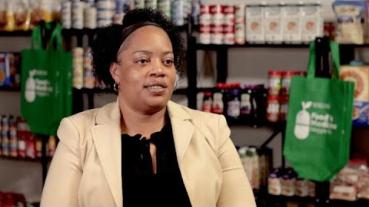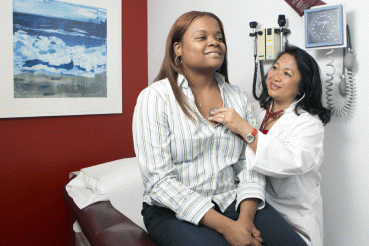For more than 20 years, Rush University Medical Center’s school-based practices have helped address the unique health needs of young people living on Chicago’s West Side. Now, with the addition of two centers this school year, at Wendell Phillips Academy High School and Dunbar Vocational Career Academy, RUSH is reaching nearly 1,000 teens in the South Side’s Bronzeville neighborhood.
RUSH and school employees, public officials and donors recently celebrated the opening of the center at Phillips Academy with a ribbon-cutting. The center will serve students year-round, with health care, health education, mental health support and other services.
“A lot of our students have developed really trusting relationships with the staff here,” said Phillips interim principal Virag Nanavati. “With the community we’re in and the trauma we’ve experienced as a school, it’s very beneficial that our students to have access to social workers, counselors, nurse practitioners, and our students are taking advantage of these services.”
The health center brought COVID-19 vaccine to students when it was hard to get while also making sure students got the physicals they were required to have to attend school or play sports, Nanavati said. The students turn to the center for reproductive health services and mental health counseling.
Speaking on behalf of the student body, Phillips senior Omolara Atoyebi said teens appreciate having a health center they can easily access during the school day.
“Students have adults they can talk to for advice if they need it,” said Atoyebi, who will be attending Cornell University in the fall to study biology and health in society. “We’re always sure to be greeted warmly by staff and welcomed by everyone here.”
Phillips, located at 244 E Pershing Road, and Dunbar, at 3000 S. King Drive, had health centers in their schools until their provider, Mercy Hospital, was sold in April 2021. RUSH took on the challenge of opening two new centers in a matter of months to minimize the gap in services.
With grant funding and additional financial support from the RUSH BMO Institute for Health Equity, the Illinois Department of Public Health and donors, RUSH’s Office of Community-Based Practices, which brings care to underserved neighborhoods, revamped the spaces and assigned clinical providers and office personnel to staff the centers. As they worked through the fall, RUSH offered “pop-up” services, such as COVID-19 vaccines, health education and mental health care, said Sally Lemke, DNP, director of Community-Based Practices. By January, the centers were open.
“We live in very complex times, and it’s easier sometimes just to say we really can’t do it, it’s too hard,” said Susan L. Freeman, MD, MS, vice provost and senior vice president of Rush University. “And this group of people said ‘We’re doing this. It isn’t too hard. It is exactly the work that we should be doing.”
David A. Ansell, MD, MPH, senior vice president for community health equity, agreed, noting that the staff had the added challenges of opening not one, but two centers during the pandemic.
“Not only are we cutting the ribbon here, we will be cutting the ribbon at Dunbar,” Ansell said. “If we’re serious about ending racism and all the conditions that harm people, we have to bring health to the community.”
Rush’s centers, part of the network of 33 health centers based inside Chicago Public Schools, serve more than 2,100 students at five institutions:
- Orr Academy High School/KIPP One
- Richard T. Crane Medical Preparatory High School
- Simpson Academy
- Dunbar Vocational Career Academy
- Wendell Phillips Academy
Students in these schools receive, at no charge, medical and behavioral health services, including acute care, management of chronic conditions, such as asthma, individual and family therapy, health screening and testing.
“Students need a place where it’s not going to be a disruption to them, their parents or guardians, or whoever needs to get them to a physical or an asthma treatment,” Raechel Ferry-Rooney, DNP, APRN, said in an interview with Block Club Chicago.
Ferry-Rooney has seen a steady increase in students since the health center’s reopening. “They can literally come from upstairs in their English class, and we can be in contact with parents if it’s something parents should know about.”




